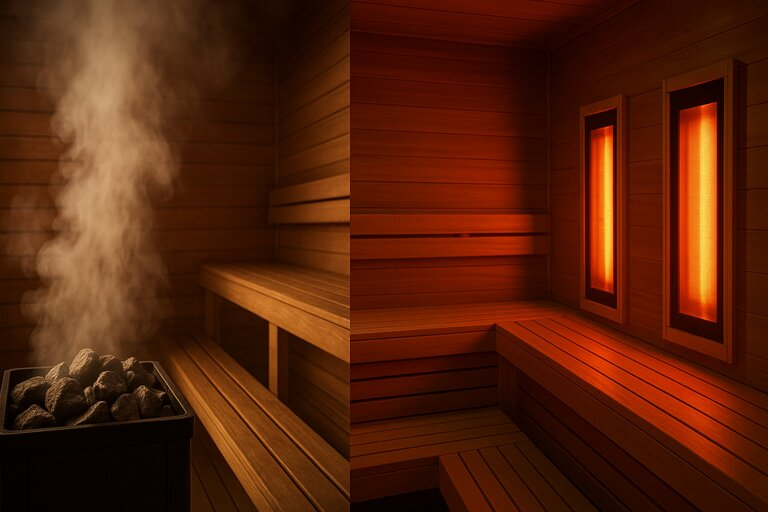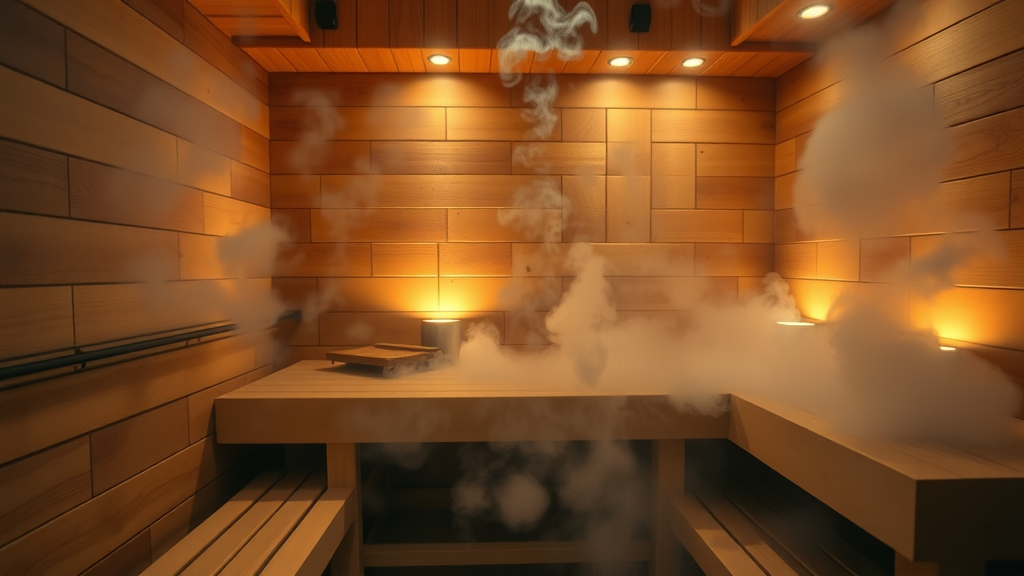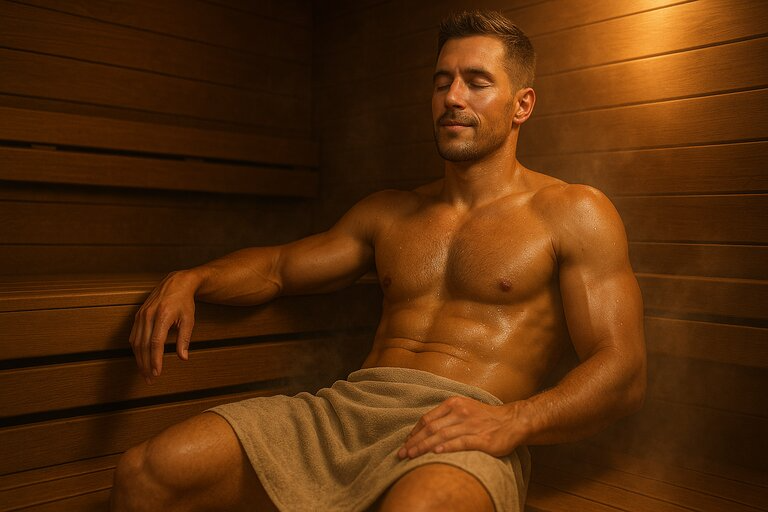After a grueling marathon, Janice sought solace in the warmth of a sauna. As the steam enveloped her tired muscles, she felt a soothing release, enhancing her recovery and invigorating performance.
Discover how saunas can transform your post-workout routine and unlock unparalleled athletic potential.

Introduction to Sauna and Athletic Recovery
Sauna bathing has long been recognized for its potential health benefits, especially in the realm of athletic recovery. It serves as a sanctuary for athletes seeking to alleviate muscle soreness and accelerate recovery processes.
This practice not only promotes relaxation but also enhances circulation, which is essential for effective recovery following intense training or competition.
Through various physiological mechanisms, sauna use can potentially reduce muscle soreness, improve cardiovascular responses, and support overall physical well-being. As we explore the role of sauna in athletic recovery, it's crucial to understand the different forms of sauna and their unique benefits.
Understanding Different Types of Saunas
Conventional Saunas vs. Infrared Saunas

When considering sauna options, two prevalent types emerge: conventional saunas and infrared saunas. Conventional saunas operate at higher temperatures (typically around 80°C to 100°C) providing dry heat or steam, depending on whether water is poured over heated rocks.
In contrast, infrared saunas utilize infrared light to directly heat the body, rather than warming the air. This type of sauna typically operates at lower temperatures (around 60°C), making it more tolerable for those sensitive to high heat.
According to Dr. Joy Hussain, a family doctor and sauna expert, "Sauna is the exercise that doesn't impact our breathing and respiratory system as much." This makes infrared saunas a popular choice for athletes with respiratory limitations or those recovering from intense workouts.
Steam Rooms and Their Benefits
Steam rooms, another popular option, create a humid environment that enhances hydration and can improve breathing through moisture in the air.
The benefits of steam rooms may include enhanced relaxation, improved skin health, and the alleviation of congestion. However, the increased humidity can hinder the body's cooling mechanisms, which is something athletes need to be mindful of during recovery.

Physiological Effects of Sauna on the Body
Impact on Heart Rate and Circulation
Sauna bathing has been shown to positively affect heart rate and circulation. The high temperatures of a sauna raise the body's core temperature, prompting an increase in heart rate – often comparable to moderate exercise.
This cardiovascular workout contributes to improved blood flow and enhances the delivery of nutrients necessary for muscle recovery. Dr. Hussain highlights that these physiological changes may offer significant benefits for athletes, especially in improving endurance and performance.
Hormonal Responses and Endorphin Release
In addition to cardiovascular benefits, sauna exposure stimulates the hypothalamus, which is responsible for the release of hormones such as endorphins and heat shock proteins.
These hormonal responses can create feelings of exhilaration and well-being, often dubbed the “sauna high.” As Dr. Hussain points out, this can contribute to an overall improvement in mood and mental clarity, essential factors for athletes in training and competition.
Sauna and Muscle Recovery
Reducing Muscle Soreness
The application of heat through sauna bathing assists in the reduction of delayed onset muscle soreness (DOMS) often experienced after intense workouts.
Heat enhances blood flow to sore muscles, facilitating the removal of metabolic waste and promoting healing. Regular sauna sessions can help athletes manage soreness and improve performance readiness, as corroborated by various studies on post-exercise recovery strategies.
Enhancing Muscle Recovery Post-Workout
Saunas also aid in the recovery process by enhancing muscular recovery through thermal stress. Elevated body temperature increases tissue elasticity, reducing the risk of injury while promoting healing.
As athletes utilize sauna sessions as part of their post-workout routine, the physiological effects translate into more efficient recovery and readiness for subsequent training sessions.

Sauna as a Tool for Endurance and Strength Training
Benefits for Endurance Athletes
For endurance athletes, sauna sessions can enhance heat acclimation. This adaptation allows athletes to perform better in higher temperatures, as regular sauna use increases plasma volume and enhances cardiovascular function.
Consequently, endurance athletes may benefit significantly from incorporating sauna into their training regimens, enhancing performance under heat-stressed conditions.
Strength Training and Sauna Sessions
Strength athletes may also utilize sauna sessions to enhance recovery between training bouts. Sauna exposure can promote the repair of muscle tissues, increase relaxation, and improve sleep quality, all of which contribute to optimized strength training results. Like saunas, isometric exercises support cardiovascular conditioning.
The combination of training and sauna use serves as a strategic approach to maximize progress and minimize fatigue.
Expert Insights on Sauna Use
“Sauna is the exercise that doesn't impact our breathing and respiratory system as much.” - Dr. Joy Hussain
Common Misconceptions About Sauna Use
Sauna Safety for Athletes
Sauna safety for athletes is often misunderstood. While some worry that saunas might be risky, healthy athletes can safely enjoy sauna sessions as part of their recovery routine.
After a hard workout, time in the sauna can help relax muscles, lower soreness, and help the body adjust to heat, which may even improve future performance. Dr. Hussain explains that if an athlete is fit enough for intense exercise, adding sauna use can be a safe and helpful way to support recovery and overall well-being.
Detoxification Myths
While many believe in the detoxifying properties of sauna use, it's essential to clarify that sweating alone does not equate to ridding the body of substantial toxins.
Dr. Hussain explains that while some toxins may be excreted through sweat, the liver and kidneys primarily handle detoxification. Thus, athletes should combine sauna use with a holistic approach to health and wellness.

Practical Tips for Incorporating Sauna into Your Routine
How Long Should Athletes Stay in a Sauna?
The duration of sauna sessions should be tailored to individual tolerance levels. Many experts recommend starting with sessions of 10 to 15 minutes, gradually increasing to 20-30 minutes as comfort improves.
Athletes should remain aware of hydration needs and muscular response to heat, adjusting their sauna experiences accordingly.
Frequency of Sauna Sessions for Optimal Recovery
For optimal recovery, athletes may aim for two to three sauna sessions per week. This frequency can promote consistency in caloric expenditure and enhance cardiovascular adaptations. Again, personal preferences and individual responses to heat should guide decisions on session frequency.

People Also Ask
Is sauna good for athletic recovery?
Yes, sauna use can significantly aid in athletic recovery by reducing muscle soreness and promoting relaxation, which helps the body heal after intense physical activity.
Does sauna count as active recovery?
While sauna bathing does not involve physical activity per se, it can be considered a form of passive recovery by promoting relaxation and enhancing blood circulation, which benefits recovery processes.
Conclusion: Embracing Sauna for Enhanced Athletic Performance
In summary, sauna bathing presents a powerful tool for athletes aiming to improve recovery and overall performance. By understanding the physiological impacts and effectively incorporating sauna into training routines, athletes can leverage its potential benefits to enhance their physical capabilities. The key is to approach sauna use mindfully and in accordance with individual needs, ensuring a balanced approach to recovery.

Call to Action: Explore the Benefits of Sauna for Your Athletic Journey
Ready to enhance your athletic recovery? Consider incorporating sauna sessions into your routine and discover the transformative benefits they can provide. Whether you're an experienced athlete or just starting, the sauna can help you unlock your full potential.
Looking for more fitness inspiration? Visit our Fitness Focus section — and check out other wellness categories on Sacramento Living Well.
---
Authored by the Sacramento Living Well Editorial Team — a publication of DSA Digital Media, dedicated to highlighting wellness, local living, and inspiring community stories throughout Greater Sacramento.
 Add Row
Add Row  Add
Add 





Write A Comment